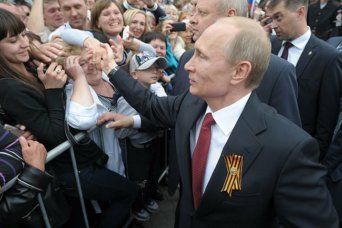- About
- Topics
- Picks
- Audio
- Story
- In-Depth
- Opinion
- News
- Donate
- Signup for our newsletterOur Editors' Best Picks.Send
Read, Debate: Engage.
| topic: | Good Governance |
|---|---|
| located: | Russia, China |
| editor: | Igor Serebryany |
Russia lost at least $8 billion in one year since president Vladimir Putin has demanded the Central Bank to swap its dollar assets for Chinese RNB.
According to the latest CB report available (issued in March), Russia has lost an amounted $7.7 billion. And according to the most recent estimations, the total lost profits have reached $11.3 billion by October 2019.
Since March 2018, when Putin demanded to "de-dollarize" the Russian economy, the Central Bank cut its dollar reserves from 43 to 23 percent, while increasing Chinese yuan reserves from 5 to 14 percent.
The CB is following this path despite the fact that China's People's Bank has steadily been devaluating yuan against the dollar as a weapon in its trade war with the United States. Since the start of the "war", the yuan has lost 6.5 percent against the dollar.
Vladimir Putin, who said seven years ago that Russia should "catch Chinese wind in its sails", now seems to be realising that his windjammer has gone too far in the wrong direction. Earlier in October, he said unexpectedly that Russia has never planned to write off the dollar entirely and even called the FRS to watch dollar fluctuations more closely.
When demanding from the Central Bank to change its dollars to yuans, Putin did not foresee that this would make Russia hostage to two powers Moscow could not control, executive director of the Moscow Partners investment company Eugeny Kogan says.
"The US dollar has been the world's reserve currency not because somebody ordered that but because it has credibility based on American economic, technological and military powers. No country may afford to de-dollarize its foreign trade unless another country emerges which would compete with the US on par", he stresses.
Putin's decision to "play yuan" has also been shortsighted because Beijing has been erecting "a rubber wall" between China and Russia in recent years. In late 2018, Beijing officially withdrew from negotiations with Moscow over mutual trade in national currencies, which Russia had been for waiting with great impatience.
Despite the fact that this June Vladimir Putin and Xi Jinping agreed that such a deal would be feasible, Beijing would use it only as a "paper bomb" in its trade disputes with the US, an expert in the Far East Institute of the Russian Academy of Science Alexander Larin believes.
"In reality, China has completely frozen currency operations with Russian companies and banks. Currently, nearly 76 percent of all Russia-China trade is being conducted in dollars. Russia's trade with China has been the most "dollarized" among all Russian trade partners", he says.
Larin explains that China simply sees it senseless to strike any long-term deals with Russia, a country Beijing considers economic and politically bankrupt. In 2018, Chinese investments in the Russian economy dropped by 24 percent compared to 2017.
"The losses the Russian economy has been suffering due to forced "yuanization" show what happens when some leaders attempt to dispute objective economic realities for the sake of questionable geopolitical profit", the expert concludes.
